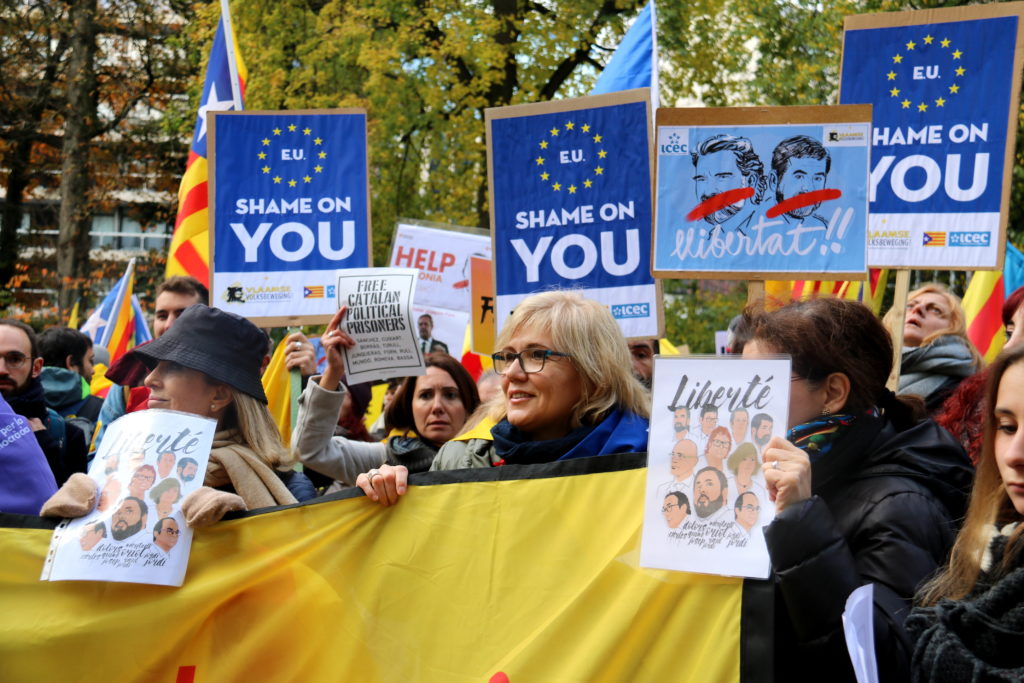06.12.2017 - 16:31
Judge Llanera’s decision to withdraw the European arrest warrant issued for the exiled members of the Catalan government and the momentous rallying effort that has begun today and will culminate on Thursday with the Brussels demonstration are two important, beautifully-timed victories, now that Catalonia’s election campaign has just kicked off.
The Spanish judge’s decision sheds light on many things, indeed. First of all, if anything, it underscores the peculiar workings of Spain’s justice system in the most spectacular way yet: by exposing it before the eyes of everyone in Europe. Llanera has withdrawn the arrest warrant for the Catalan president and his ministers because he knows that Belgium would have either turned it down —the defendants would have had no guarantees of due process in Spain—, or it would have been granted but confining a possible guilty sentence to what would be expected as normal in any democratic country and, therefore, not in Spain. When judge Llanera is pushing for a thirty-year sentence but Belgium believes that six months should be the maximum penalty, the gap is no longer just big, but also inexplicable. So much so that Spain’s justice has chosen to make a U-turn and effectively admit before Spain’s European partners that Puigdemont and his ministers have not committed any crimes by EU standards. Belgium’s justice has rushed to drop all cautionary measures and now Carles Puigdemont and his cabinet are free, so long as they do not travel back to Spain. This development is a game-changer, indeed. It is not longer up to Europe to explain why it won’t hand them over to Spain, but it is Spain who should explain the reason why several European citizens who are free and haven’t been formally charged may, in fact, be arrested and remanded in custody with the utmost severity, if they choose to cross the border into Spain.
The ensuing judicial and political embarrassment also highlights just how wise it was to keep the government exiled in Brussels. Those who mocked the strategy or thought it bizarre should now admit that it was very well thought through and made a lot of political sense. The EU’s institutions have behaved in the most despicable way, but Europe —Brussels is Europe, too— remains an enviable space of freedom as seen from Spain. The attitude of the Belgian authorities should be food for thought for anyone who thinks that we stand alone.
The first consequence of lifting the cautionary measures imposed on the legitimate government of Catalonia is that president Puigdemont and ministers Ponsatí, Serret, Comín and Puig will be free to take part in tomorrow’s demonstration. They will be European citizens exercising their political rights, untouched and untouchable. Considering everything that has happened, it will surely be a very emotional day for them.
Furthermore, Thursday’s demonstration won’t just be about meeting the Catalan government. It will also be a warning for the EU’s authorities. Brussels is used to all kinds of street demonstrations, but few of the magnitude which we can already anticipate for this Thursday’s, which, interestingly, will be joined by many people coming from the rest of the Catalan Countries.
The coup d’état against Catalonia’s self-government would have failed without the full, enthusiastic support of the European Commission and the Commission cannot skirt its responsibility. We would be wrong if we expected the EU’s authorities to be so impressed by the march that they will change their stance overnight. But there is no doubt that the many thousand Catalans marching in Brussels will open their eyes to the fact that the Catalan affair is far from resolved along the lines suggested by Rajoy, as they believed it would be.
Juncker’s decision has turned out to be suicidal for the Union’s interests, as well as regrettable in moral and political terms. The EU’s coherence, its internal cohesion and its international standing will pay a high price over that decision. By dropping the arrest warrant, Spain has proved that much: Europe’s most basic principles of justice and freedom have been blown to smithereens. And the many thousand Catalans who will demonstrate in Brussels are a reminder for the European authorities that the problem which Rajoy claimed would go away by invoking Article 155 is still very much here and its persistence concerns them.
In this battle that we are fighting, the cost of supporting one option or the other is the decisive factor. On October 27, the easiest thing to do for the European Commission was to support Rajoy’s views. Although it was not immediately apparent that day, many of the member states did not share that position and, for instance, I believe that today we should we thankful to Belgium for its freedom, democratic rigour and for remaining impervious to pressure. Now Rajoy faces an impossible challenge: he must prove that his methods will solve the Catalan issue. That is why it is so important that many, many ordinary people gather to march in Brussels tomorrow. That is why it is so important that a basic pillar of Europe’s standards —the notion that rights and liberties must be the same for everyone, everywhere— has been publicly scorned in such a crass manner by Spain.


